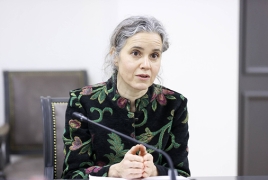
The EU Special Representative for the South Caucasus and the Crisis in Georgia, Magdalena Grono, emphasized the importance of regional peace and stability, stating that the EU considers it crucial for the Armenia-Azerbaijan settlement process to proceed in a calm and constructive environment. She noted that recent bilateral engagements and previous discussions in various formats have yielded important progress.
She stated that during her meetings in Baku, she heard statements from Azerbaijani officials that differed from their public rhetoric on peace in the South Caucasus, reports Armenpress.
"During discussions in Baku, I heard encouraging statements regarding peace and stability in the region. These remarks often contrasted with what has been stated publicly, particularly regarding the continuation of the settlement process between the two countries. I believe that the first important phase of the process is already showing results—Azerbaijan and Armenia have a structured dialogue with a clearly agreed framework and basis."
"Now is the time to demonstrate the political will needed to turn the page on the conflict, find mutually acceptable solutions to unresolved issues, and ensure a peaceful and more prosperous future for all residents of the region," she added.
Regarding Azerbaijan’s objections to Armenia’s military procurement, Grono noted that her interlocutors in Baku presented their perspective, stressing that the "conflict has been resolved," the "situation is stable," and there is "no intention to use force." She emphasized that progress in border delimitation is a positive signal, raising hopes that this momentum will continue in other areas, including the peace treaty negotiations, the reopening of transport links, and humanitarian issues.
Addressing Azerbaijan's accusations against the EU Monitoring Mission, Grono clarified that the mission was deployed based on Armenia’s sovereign request. She dismissed allegations of “espionage” or destabilization as misinformation, stressing that the mission is strictly civilian and unarmed, operating within its mandated framework.
Discussing her meetings in Yerevan, Grono noted that the Armenian side remains constructive and committed to peace efforts. While acknowledging existing challenges in the process, she stated that Armenian authorities are firmly advancing toward stability.
On the EU’s next steps, she reaffirmed that the EU continues to support Armenia-Azerbaijan dialogue, focusing on humanitarian issues such as demining and missing persons.
Regarding the regional connectivity agenda, Grono referenced Armenia’s "Crossroads of Peace" initiative, stating that its core concepts are acceptable, but practical details still require agreement. She expressed hope that Armenia and Azerbaijan would soon reach an understanding on reopening transport links.
On January 16, Armenia’s Foreign Ministry announced that Armenia and Azerbaijan had reached an agreement on a new segment of border delimitation. The agreement entails starting work from the northern section at the Armenia-Azerbaijan-Georgia tri-border point and continuing southward to the Armenia-Azerbaijan-Iran border.

